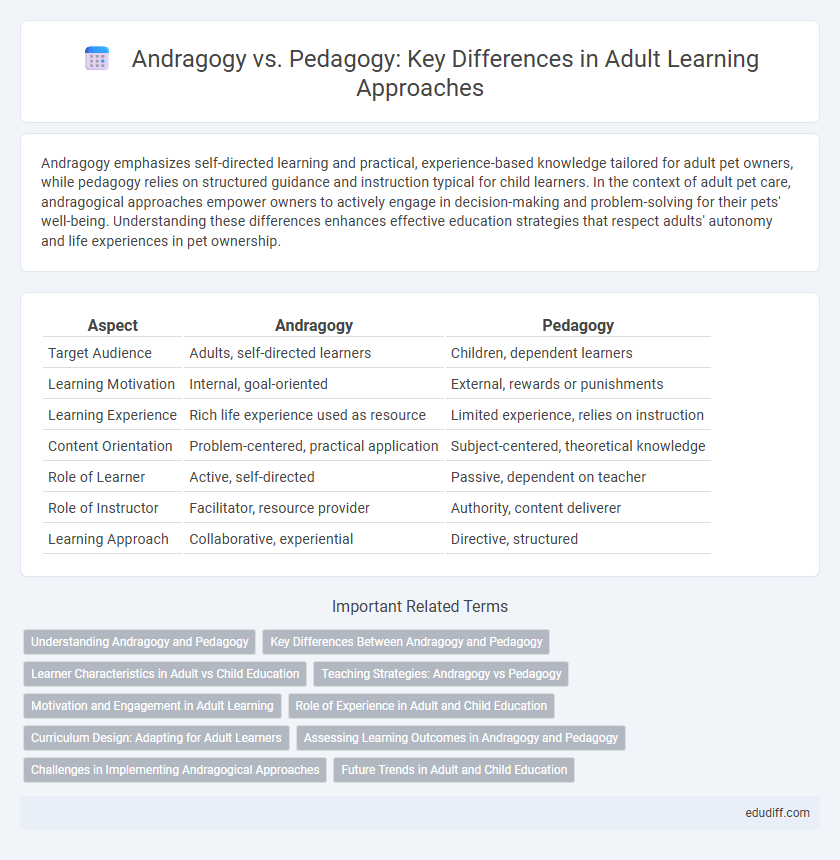Andragogy emphasizes self-directed learning and practical, experience-based knowledge tailored for adult pet owners, while pedagogy relies on structured guidance and instruction typical for child learners. In the context of adult pet care, andragogical approaches empower owners to actively engage in decision-making and problem-solving for their pets' well-being. Understanding these differences enhances effective education strategies that respect adults' autonomy and life experiences in pet ownership.
Table of Comparison
| Aspect | Andragogy | Pedagogy |
|---|---|---|
| Target Audience | Adults, self-directed learners | Children, dependent learners |
| Learning Motivation | Internal, goal-oriented | External, rewards or punishments |
| Learning Experience | Rich life experience used as resource | Limited experience, relies on instruction |
| Content Orientation | Problem-centered, practical application | Subject-centered, theoretical knowledge |
| Role of Learner | Active, self-directed | Passive, dependent on teacher |
| Role of Instructor | Facilitator, resource provider | Authority, content deliverer |
| Learning Approach | Collaborative, experiential | Directive, structured |
Understanding Andragogy and Pedagogy
Andragogy focuses on adult learning principles, emphasizing self-direction, practical experience, and intrinsic motivation, while pedagogy centers on child learning with structured guidance and external motivation. Understanding andragogy involves recognizing adults' need for relevance, problem-solving, and autonomy in the learning process. Pedagogy, by contrast, is designed around the developmental stages and dependency of children on teachers for knowledge acquisition and discipline.
Key Differences Between Andragogy and Pedagogy
Andragogy centers on adult learning principles, emphasizing self-direction, practical experience, and immediate application of knowledge, whereas pedagogy focuses on child learning, relying on structured guidance and teacher-led instruction. Adults bring prior knowledge and expect learning to be relevant and problem-centered, while children require foundational skill building and more motivation from external sources. The key differences lie in learner autonomy, motivation, and the role of experience in shaping the educational approach.
Learner Characteristics in Adult vs Child Education
Adult learners in andragogy demonstrate self-direction, practical experience, and readiness to apply knowledge immediately, contrasting with child learners in pedagogy who often require structured guidance and foundational skill-building. Andragogical approaches emphasize autonomy, leveraging adults' prior knowledge and intrinsic motivation, while pedagogical methods focus on teacher-led instruction and developmental stages. Understanding these learner characteristics is essential for designing effective educational strategies tailored to adult education.
Teaching Strategies: Andragogy vs Pedagogy
Andragogy employs learner-centered teaching strategies that emphasize self-direction, experiential learning, and problem-solving to engage adult learners effectively. Pedagogical methods typically focus on instructor-led, content-driven approaches suited for dependent learners in structured environments. Tailoring teaching strategies by integrating andragogical principles enhances motivation and knowledge retention among adults.
Motivation and Engagement in Adult Learning
Motivation and engagement in adult learning hinge on andragogy's emphasis on self-directed goals, intrinsic motivation, and practical relevance, contrasting with pedagogy's reliance on external rewards and structured guidance. Adults engage deeply when learning aligns with their life experiences and immediate needs, fostering autonomy and active participation. Understanding these dynamics enhances instructional strategies, leading to improved retention and application in adult education contexts.
Role of Experience in Adult and Child Education
Experience serves as a foundational pillar in andragogy, where adult learners actively draw upon their accumulated knowledge to integrate new concepts, enhancing retention and practical application. In contrast, pedagogy often prioritizes structured content delivery, with less emphasis on the learner's prior experience, catering to the developmental stage of children. This distinction highlights how experiential learning in adults fosters deeper engagement and autonomy compared to the guided learning approach predominant in childhood education.
Curriculum Design: Adapting for Adult Learners
Curriculum design for adult learners prioritizes self-directed learning, experiential activities, and practical application of knowledge, contrasting with the more structured and directive approaches used in pedagogy for children. Andragogy emphasizes flexibility, relevance to real-life situations, and incorporating learners' prior experiences to enhance engagement and retention. Effective adult education curricula align content with learners' goals, promoting critical thinking and problem-solving skills essential for workplace and personal development.
Assessing Learning Outcomes in Andragogy and Pedagogy
Assessing learning outcomes in andragogy emphasizes self-directed evaluation methods, reflective practices, and real-world application to measure adult learners' mastery and relevance of knowledge, contrasting with pedagogy's structured, standardized testing primarily designed for children. Andragogical assessments often incorporate formative feedback, experiential learning projects, and collaborative evaluations to align with adults' intrinsic motivation and practical experiences. Pedagogical assessments focus on objective metrics, curriculum alignment, and incremental skill-building benchmarks to ensure foundational knowledge acquisition and cognitive development.
Challenges in Implementing Andragogical Approaches
Implementing andragogical approaches in adult education faces challenges such as learners' resistance to self-directed learning and educators' limited experience with facilitative teaching methods. Adults often bring diverse backgrounds and expectations, requiring adaptive strategies to engage their intrinsic motivation effectively. Overcoming institutional constraints and ensuring sufficient resources for personalized learning environments remain critical for successful andragogy integration.
Future Trends in Adult and Child Education
Emerging trends in adult education emphasize andragogy's learner-centered approach, integrating technology and personalized learning to enhance skill acquisition and lifelong development. In contrast, pedagogy in child education increasingly incorporates interactive digital tools and social-emotional learning frameworks to support cognitive and emotional growth. The convergence of adaptive learning technologies and data analytics is transforming both educational models, promoting flexibility and individualized pathways for learners across age groups.
Andragogy vs Pedagogy Infographic

 edudiff.com
edudiff.com